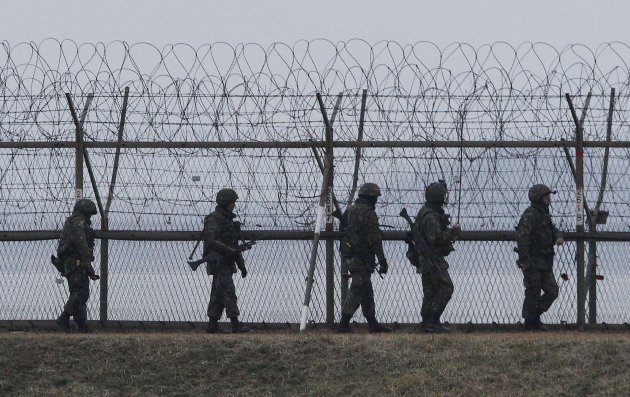 South Korean army soldiers patrol along a barbed-wire fence near the border village of the Panmunjom, in Paju,??
South Korean army soldiers patrol along a barbed-wire fence near the border village of the Panmunjom, in Paju,??
Warships might not sail, more missile tests might be postponed, potentially provocative photos of bombers will stay under wraps: After a muscular, even aggressive early response to North Korea?s nuclear saber-rattling, the United States has shifted into a more cautious mode, eager to avoid giving Pyongyang any excuse for further escalation, officials say.
The White House, the Pentagon and the State Department ?are looking very carefully? at American words and pending actions ?to make sure that they can?t be misread, or that the likelihood of them being misread is low? as well as ?to not give the North Koreans fodder for escalation, excuses to take action,? according to an administration official familiar with the U.S. strategy.
?There?s not a formal review going on,? and ?we are not going to withhold or postpone any step that we consider necessary for the safety of the American people,? the official, who requested anonymity, told Yahoo News.
?But those things that could be not necessary? We?re giving those a closer look,? the official said. That means assessing ?our ship deployments, missile tests? to make sure they don?t unnecessarily raise the temperature in the already heated standoff.
The most obvious sign of this new approach out of Washington was Defense Secretary Chuck Hagel?s decision late last week to postpone the test launch of an InterContinental Ballistic Missile that had been scheduled for Tuesday.
"We recognized that an ICBM test at this time might be misconstrued by some as suggesting that we were intending to exacerbate the current crisis with North Korea," a defense official said Monday on condition of anonymity. "We wanted to avoid that misperception or manipulation."
The administration's initial response had several goals.
It aimed to reassure South Korea and Japan about the strength of the U.S. commitment to their security, in part to ensure that South Korea did not do anything rash. There also was the need to deter North Korea and impress upon its young new supreme leader, Kim Jong Un, the seriousness of the situation. And it aimed to avoid turmoil on global markets while making it clear to China that its client state and neighbor had overreached.
So Obama ordered warships to the waters off the Korean peninsula, highlighted the beefed-up missile defense plans and, in an unprecedented move, disclosed that B-2 and B-52 bombers took part in a regular U.S.-South Korean military exercise, dropping dummy munitions. The Pentagon released photographs of those warplanes, sending a "Hey, we can bomb the crap out of you" message to the North, the first official said.
But the American response seemed to change late last week.
In the rhetorical battle, American officials have stuck more closely to a familiar refrain: Rather than respond in detail to every North Korean action, every angry message from Pyongyang, they have emphasized that the Stalinist regime is only isolating itself more and hurting its people. That joint U.S.-South Korea exercise is still underway, but you don't hear quite so much about it.
?It?s been conscious,? the first official said. ?The lowering of the profile of the military, going from showing pictures of stealth bombers to canceling this missile test, it?s all part of an overall attempt to stay lower key.?
The White House has denied it escalated the crisis. And the official emphasized that Washington only aimed "to show our rock-solid commitment to our allies in the region."
But "it's been clear that the North Koreans have decided that they have an interest in going tit-for-tat with us, raising the temperature," the official said. "We have no desire to see this escalate any further."
Source: http://news.yahoo.com/blogs/ticket/u-working-escalate-north-korean-standoff-094001335--politics.html
Macho Camacho Rise of the Guardians Pumpkin Pie Jack Taylor Apple Pie Recipe black friday How long to cook a turkey
কোন মন্তব্য নেই:
একটি মন্তব্য পোস্ট করুন